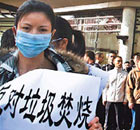Top News
Growing emphasis on education helps young athletes prepare for life after sport
By Tang Yue (China Daily)
Updated: 2010-01-15 07:51
 |
Large Medium Small |

One standout performer for Tsinghua has been Hu Kai. After impressing at sports camps and in the national college entrance examination, he was enrolled in the college's school of economics and management in 2001. He joined the track team shortly after and now trains more than two hours every weekday.
"My parents didn't want me to drop education and neither did I. I know I can't run all my life, no one can, and I didn't want to have to choose. I wanted both," he told China Daily.
Hu is better known across China as Yan Jing Fei Ren, or Flying Man with Glasses - a nickname he earned by winning the men's 100m while wearing glasses at the 2005 Universiade in Izmir, Turkey. He was the first Chinese to win a sprint at an international event.
"I feel so lucky to study in Tsinghua. It helps me in so many ways. It broadens my vision, helps me to learn more about the people and the world, and helps me be a better person rather than a mere sprinter," he said.
Chinese college training now also includes some less popular sports, like softball. All the players in the Jiangsu softball team that won bronze at the National Games last year were students at Nanjing University of Technology.
Academic study helped the squad prepare for competition both on and off the field, said business administration major Wang Yanni, 22, who played third base for Jiangsu.
"We don't train as much as other teams but it doesn't keep us from fighting in the games. The knowledge learned in the classroom stretches our thinking and helps us adjust mentality on the field," she said.
Jason Rabedeaux, a former NCAA coach for Marquette University in Wisconsin, agreed and said education must be the number one priority for students and colleges.
"That's why basketball players in the US go to college; to get an education, to get a degree," said Rabedeaux, now head coach of Jiangsu Dragons in the Chinese Basketball Association. "Education makes you better understand everything in life. You are with classmates, exchanging ideas daily. The goal is to be as rounded as an individual can be."
Since Tsinghua University kicked off its high-level sports program in 1994, the majority of its 500-plus student-athletes have found good jobs after graduation, said Du Chao, a class adviser at Tsinghua for 15 years.
"They are more confident than other students after taking part in fierce competition. Some of them even applied for overseas schools to pursue higher qualifications, just like the other students at Tsinghua," she said.
However, financial support for Chinese students who play for college teams remains insufficient compared to what is available in the US.
Shang Ping, once a highly touted power forward with the Chinese national youth team, played basketball for the University of Nebraska from 2007 until 2009 and earned a bachelor's degree in economics.
"We have been taken good care of since we were playing for our college. The scholarship covers all my tuition and accommodation," said the 25-year-old from Heilongjiang province. He has signed to play this season for Beijing Ducks.
"Sometimes I had to miss class due to a match or training session and the school would send tutors to help me keep up with my academic work."
Robbie Tenenbaum, who coaches the women's sculls team at Clemson University in South Carolina, told China Daily about 20 out of 55 rowers on the team received scholarships of $35,000 a year, as well as "anything else they need".
By contrast, Hu receives a bursary of just 3,000 yuan a year from Tsinghua, which pays little more than half his tuition fees.
"And not every student on the athletics team enjoys this benefit," said Hu.
The sprinter did not even have a regular doctor until he was included in the national squad for the 2008 Beijing Olympics, where he became the first Chinese to ever make the second round of the 100m.
Meanwhile, his coach Li Qing said he is too busy to concentrate solely on Hu.
"In the developed NCAA system, coaches are full-time and teamed with professional researchers and medical staff. Here we have to teach physical education to ordinary students and must struggle to meet other requirements while taking care of training," he said.
The problem is rooted in tight and unstable budgets, said Wu Yuejian, deputy director of sports at Tsinghua University. He was reluctant to reveal how much is available for college sports, saying only that it was "random".
"Under the State system, all money goes to the professionals. Why not allocate some money to the college sports teams? I think we have proved we can do as good as professional teams in some sports," he said. "College is obviously the best option for any athlete but we need more support to keep the system growing."







